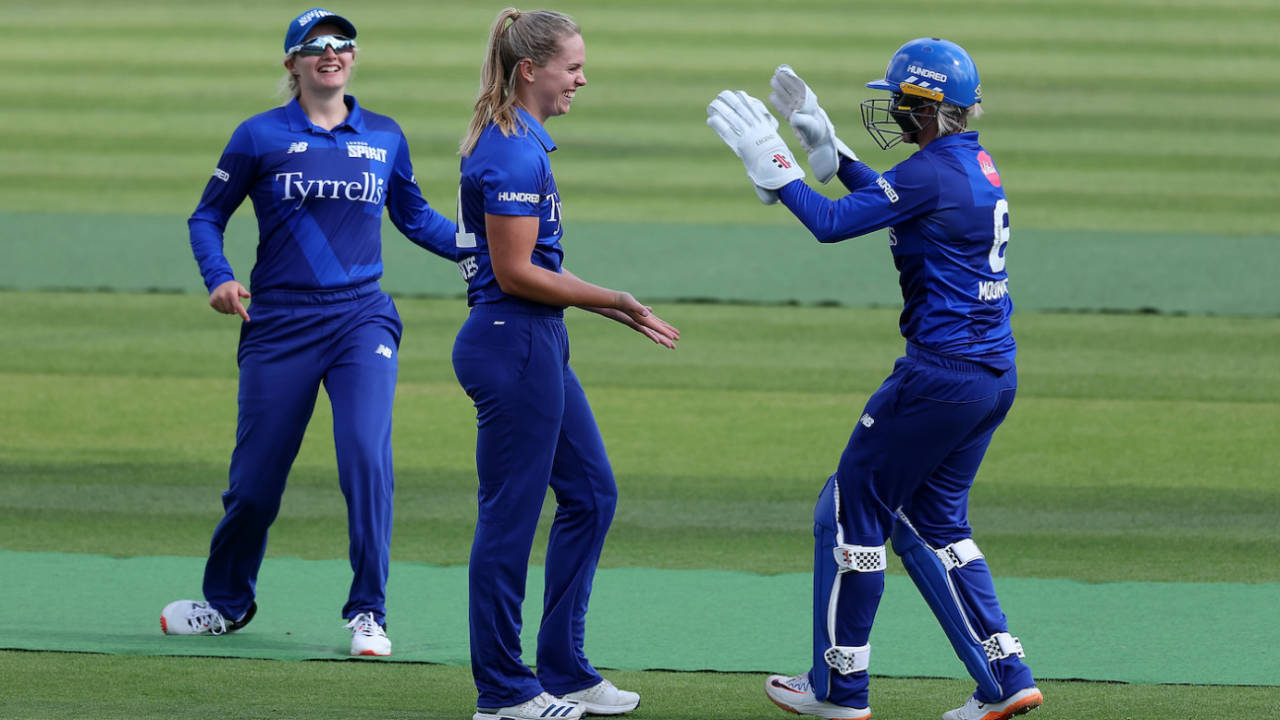Women's Hundred shows sport's evolution on fast-forward
Even dead rubbers are hugely important for players seeking franchise contracts
Cameron Ponsonby
Aug 24, 2022, 7:05 PM
Freya Davies removed Tammy Beaumont and Annabel Sutherland off successive deliveries • ECB/Getty Images
Women's cricket is changing. Money is entering the sport with players such as Lizelle Lee and Deandra Dottin walking away from the international game with a living possible purely from the money made on the domestic circuit.
As decisions, they each carry their own sadness, nuances and complications, but even so, each can still be taken with a pinch of sugar as opposed to salt in regards to how it evidences the progress of the women's game. In 2014, England women were the first ever professional women's cricket team. And less than a decade later it is possible to make a living in the sport away from the international circuit.
It also means that in games like today between London Spirit and Welsh Fire (in other words, dead rubbers) that context still exists. It's just that rather than doing so on a team basis, it does so individually. No one's winning any team prizes here, but they may earn themselves a contract somewhere else.
"It's obviously a really exciting time for all of women's cricket", said Freya Davies at the close after taking an ultimately match-winning 3 for 25 for London Spirit. "All of those domestic tournaments around the world, and yeah I'd love to go to the Big Bash, but the focus at the moment is just putting in performances and winning games for Spirit."
It is a quirk of progress in the women's game that as the sport moves forward, some of the traits we deride in other aspects of sport will come to the fore. We want our players playing for nothing but the passion and love of the game, but passion and love don't pay the bills. A sign-on fee and a bonus for 500 runs, however, does.
We want every game played as if it's their last, but the truth is that as the sport progresses, the women's game will follow the tracks of the men, with players turning out at so many competitions that the value of a title at each one slowly subsides further and further, with the real prize not being the runs you score today, but the contract they earn you for the next.
"You definitely need to keep putting in those performances and you want to do well," said Welsh Fire's Sarah Bryce after scoring 33 off 25 balls. "You don't really think of it whilst you're out there playing but if it can open up those opportunities, that's truly exciting.
"A couple of years ago, the match you played in was in front of your parents and maybe a few friends, so the fact you're playing in front of thousands of people definitely makes a difference and you feel that."
Both the floor and ceiling of the sport is lifting. And not steadily either, but in the same way that a grandparent looks on in disbelief as the 4'3" child that left them at Christmas returns the following year a 6ft7in teen. The grandparent in shock. The teen bemused. Unaware of how dramatic a change they have been through in such a short period of time.
"I think sometimes you can forget," said Davies who, having spent over a decade in the game already, has been baked into the growth spurt of the sport rather than witnessing it from afar. "But then we play here and there's a massive crowd and it's something that women's cricket wouldn't have dreamed of two years ago."
The range of reasons why it is important that each game of the Women's Hundred is broadcast exemplifies how unique a period this is in women's cricket as it seeks to continue to lay its foundations with one hand, whilst also reaching for the prizes of the top shelf with the other.
On a national level, it is important that each game is broadcast as the game is still growing in the country, with a generation of young players available and ready to be inspired under the mantra of, "you can't be what you can't see."
And yet at the same time as that is true at one end of a sport, for the players every game being broadcast is important for another reason. Just as youngsters can't be what they can't see, neither can franchise owners across the world sign what they can't see.
"Runs on Sky count double" is an apocryphal saying that has existed in cricket quarters across the land for a long time. Years ago, when watching a Blast game with a friend, a former teammate of his hit a rapid fifty on telly in an otherwise lean season. But people saw. Ex-players tweeted. And a new deal was signed. The result of the game wasn't important, and yet it changed the player's life.
Similarly, as the two teams walked out at Lord's today, there was nothing on the game for either side. But thanks to the growth of the women's game, for each of the 22 individuals who took the field, it was a potentially life-changing stage.
Cameron Ponsonby is a freelance cricket writer in London. @cameronponsonby

